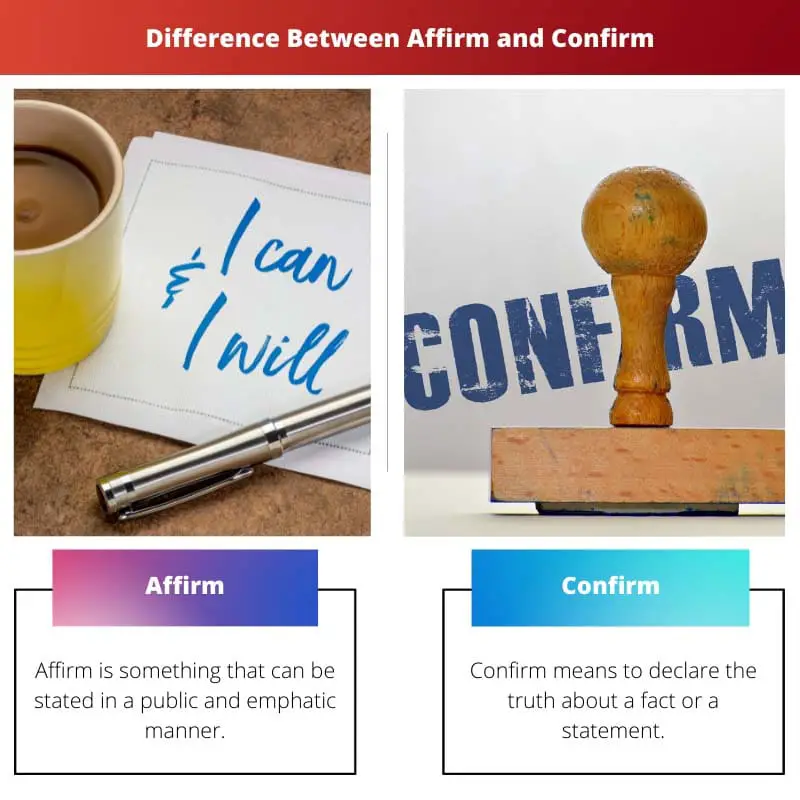It is a common mistake for people to mistake interchange words that sound similar in their conversations or use them even in social talks. Homophones are words that sound very similar but have two different meanings.
Even well-versed English rhetoricians tend to make this kind of error sometimes. One standard word pair mistaken for the opposite is Affirm and Confirm.
You would have heard the word ‘confirm’ many a time. But, the affirm verb is used in fewer familiar places only.
Key Takeaways
- Affirm means to declare or assert something as true or valid, expressing agreement or support for a statement or belief.
- Confirm means to verify or establish the truth or accuracy of something, by providing evidence or proof.
- Both affirm and confirm involve addressing the truth or validity of a statement, but they differ in the degree of certainty, and the approach taken to establish that certainty.
Affirm vs Confirm
Affirm is a strong belief in the truth or validity of a statement, such as “I will do my best to complete the project on time”. Confirm means to establish the truth or validity of something, requiring verification or proof. Confirm indicates the need for verification or proof of something that was previously uncertain.

Comparison Table
| Parameters Of Comparison | Affirm | Confirm |
|---|---|---|
| What does it mean? | Affirm means to state something without doubt or declare a person’s support for, uphold, and defend. Affirm is employed in a legal context. | Confirmation means establishing the reality or validity of something. Confirm is also utilized to confer with a spiritual rite. |
| Examples | “The mother affirmed her findings.” The mother has stated her feelings openly. | “The DNA results confirmed that he was the father of Rakhi” There is solid evidence to determine or confirm the above statement firmly. |
| Noun and its adjective | The noun here is affirmance, and the adjective is affirmable. | The adjective here is confirmable, and comfortability is its noun. |
What is Affirm?
Affirm is something that can be stated in a public and emphatic manner. It is supposed to be a transitive verb with only a few objects and the need for a direct subject so that it can oppose intransitive verbs.
Talking about its origin, affirm is derived from the Latin word affirmāre(meaning to make it officially valid and to resolute) that had been conceived from the term firmāre, which means to reinforce.
For example, She was carrying the baby in her hands. Here the baby is the direct object of carrying.
The sentence’s tone indicates that the woman is carrying the baby, and it has been stated in an assuring and strong manner. Affirm has another meaning too.
It is to support someone or something you are loyal to, like showcasing your dedication.
For example, His father was a dedicated army officer who was always loyal to Mother Earth and would always stand by his people. Here the officer is seen to be loyal to his country and shares his support for the people.

What is Confirm?
When we think of its origin, confirm is derived from the Latin word confirmāre, which means to reinforce or to enact. Confirm means to declare the truth about a fact or a statement.
It is most commonly used to assert something that may be a false belief or something that needs some confirmation to be assured.
For example, The police found evidence to confirm that the murderer was someone within the Rajput family.
It clearly shows that there is some data to believe the statement that the police have provided. According to Christian belief, confirmation is a form of sacrament delivered on a person to proclaim them as a whole church member.
If you had to appoint someone for a specific position, then the word ‘confirm’ can be well used, and it is also used to declare the death or birth of someone important too.
For example, It was confirmed that the Prince would be throned as King on the eve of his birthday.
The birth of the future heir of the Sharma family was confirmed this morning.

Main Differences Between Affirm and Confirm
- Affirm is used to give formal consent to any valid transaction, whereas confirm is used when you want to state a person’s views or opinions with firm belief.
- Even though affirm is utilized positively, confirm can be used positively and negatively.
- The other synonyms for affirm they are to warrant, declare, or claim, and their antonyms are to forbid, deny, etc. Confirm also means bear, certify, or to argue, and their opposites are invalidated, disprove, or refute.
- Affirm can be claimed to be used as a transitive or intransitive verb, depending on the context. Confirm is mainly used as a transitive verb.
- For example, we cannot affirm that the diamond is real. But the thief confessed his crime, and it was confirmed that the diamond was a fake.


I still don’t see the difference as significant. Seems redundant to me.
I respectfully disagree with you, Duncan. The article explains the importance of distinguishing these terms.
I can see your argument, Duncan, but I think the article does a good job of highlighting the discrepancy.
Another topic well explained. I always enjoy reading these types of articles.
Absolutely, Psimpson. They always provide valuable insights.
Great article! I’ve always wondered about the differences between ‘affirm’ and ‘confirm’.
This piece is somewhat pedantic and trivial in my opinion.
I understand your perspective, Obell, but I believe the distinctions are important in certain contexts.
I see your point, Obell, but I think it’s beneficial to clarify the differences between these words.
The meticulous comparison table is an excellent addition, emphasizing the nuanced differences between ‘affirm’ and ‘confirm’.
Indeed, Qbaker. The visuals make it easier to comprehend the contrasts.
Agreed, Qbaker. The table provides a clear and concise overview of the disparities.
This article is a valuable resource for anyone looking to improve their command of the English language.
Absolutely, Wclark. It’s rare to find such detailed discussions on language usage.
A thorough analysis. It’s clear that the author has put in the effort to provide a comprehensive explanation.
I couldn’t agree more, Lee. It’s evident that the author has delved deep into the topic.
Absolutely, Lee. The level of detail in the article is impressive.
Thank you for the informative article on the differences between ‘affirm’ and ‘confirm’. It’s always great to learn something new about the English language.
Absolutely! It’s enlightening to understand the subtle nuances between similar-sounding words.
I completely agree, Chris. This article provides a detailed explanation of these two words.
I appreciate the breakdown of the etymology of these words. It adds an interesting dimension to the article.
Definitely, Lily. Exploring the origins of the words enhances the overall understanding.
I found the examples provided very helpful in grasping the disparities between ‘affirm’ and ‘confirm’.
I completely agree, Arogers. The examples really solidify the concepts.